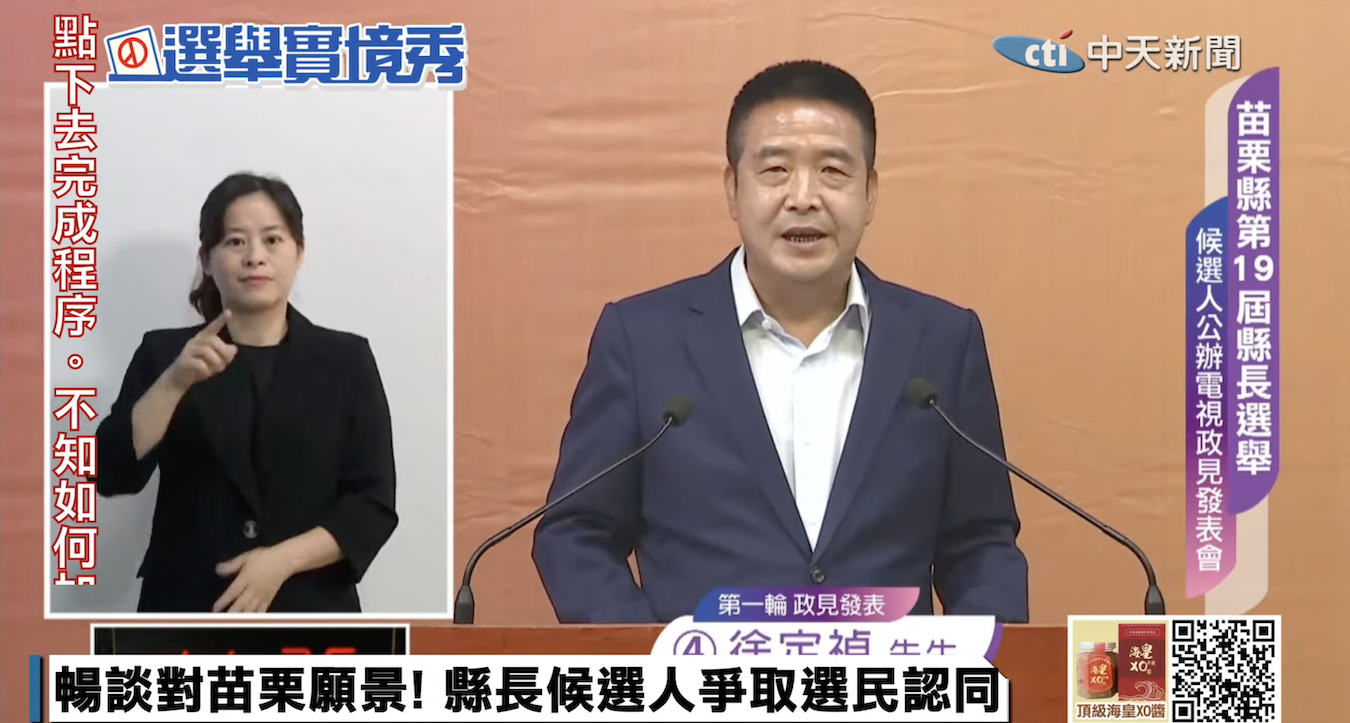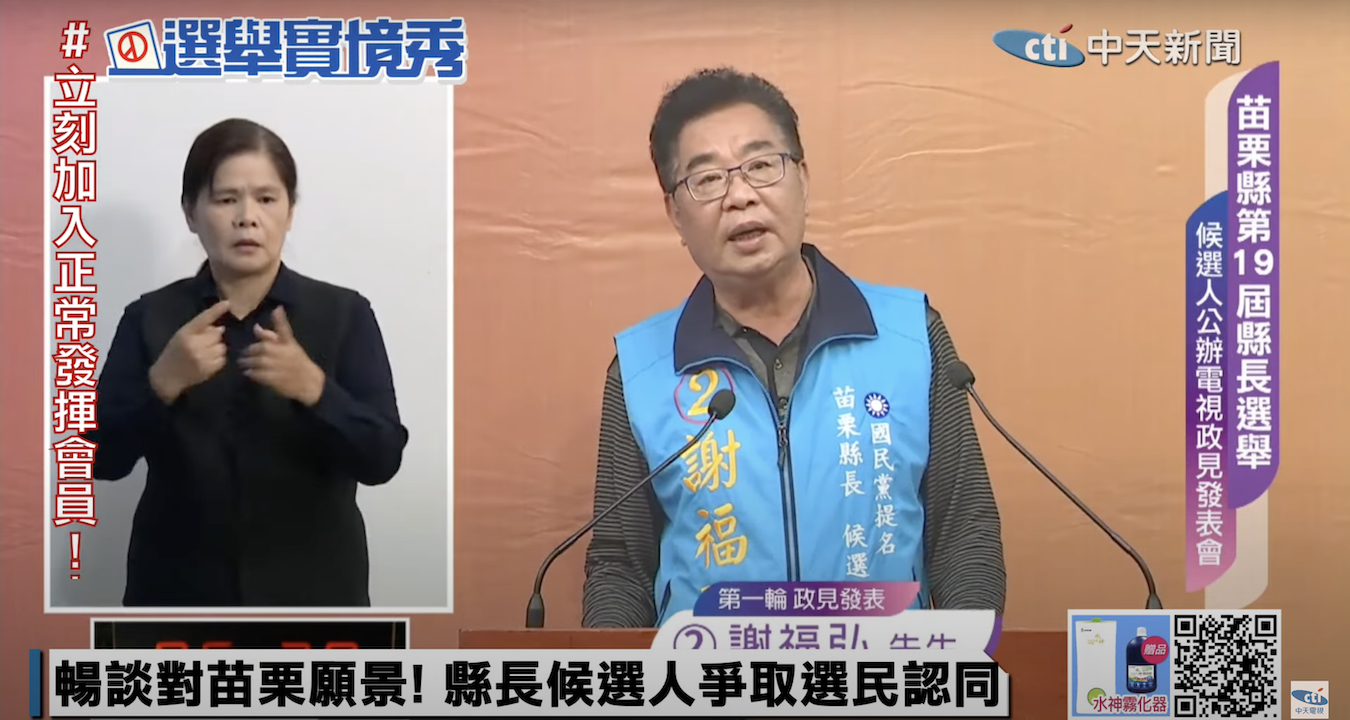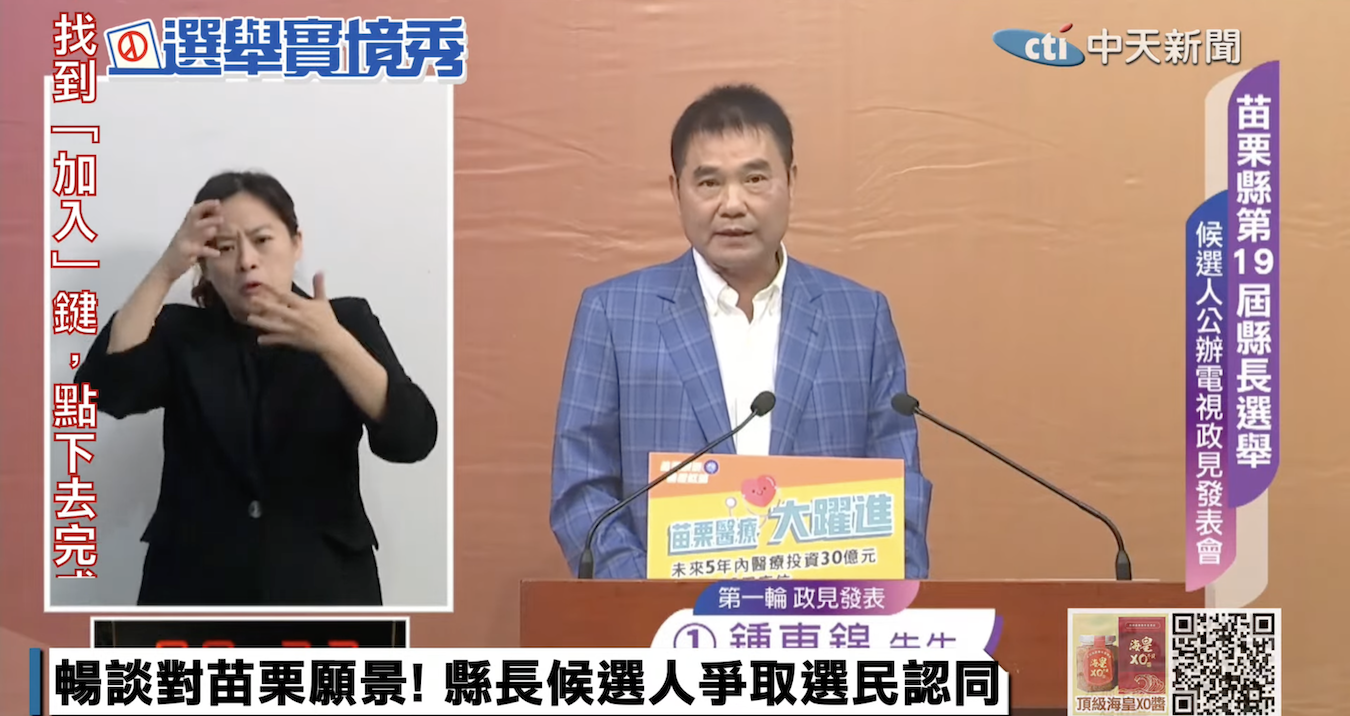by Brian Hioe
語言:
English
Photo Credit: CtiTV/YouTube
THE MIAOLI COUNTY magistrate debate was held on November 18th, consisting of three rounds. The first round consisted of an opening statement, and the second round consisted of cross-examination between candidates. Though there were five participants in the debate, the following article will focus on the three frontrunners in the race, these being the KMT’s candidate, Hsieh Fu-hung, the DPP candidate, Hsu Ting-chen, and independent candidate Chung Tung-chin.
First to speak was Hsu Ting-chen of the DPP. Hsu touted his past record as mayor of Toufen. Hsu stated that he would attract the semiconductor industry to Taiwan, stabilizing energy and power supply for this, and building up educational facilities for the semiconductor industry. Hsu would also focus on bilingual education policy in cooperation with the central government. Hsu also stated that he would assist the elderly, provide 2,000 NT for those above 60, and provide subsidies for the elderly to have free false teeth.
 Hsu Ting-chen of the DPP. Photo credit: CtiTV/YouTube
Hsu Ting-chen of the DPP. Photo credit: CtiTV/YouTube
Hsieh Fu-hung began his comments by stressing his loyalty to the ROC. Subsequently, he began attacking the DPP on issues ranging from vaccines to cross-strait relations and pork imports from the US. Hsieh also attacked what he framed as the DPP’s attempts to target media outlets critical of it, such as Want Want-owned outlets. Hsieh quoted former KMT presidential candidate Han Kuo-yu in his speech. Hsieh framed himself as a candidate without ties to vested interests in Miaoli, while stating that voters should vote for him compared to a candidate with ties to gangsters, or a DPP candidate.
That candidate with ties to gangsters was, of course, Chung Tung-chin. The current KMT county magistrate, Hsu Yao-chang, endorses Chung, and is a former KMT county councilor. In the course of the election, past gang-related murder and assault charges by Chung emerged, however. In his presentation, Chung expressed his enthusiasm for Hakka culture, and stated that he hoped to boost tourism for Miaoli. Chung stated that he would improve housing to benefit the young, as well as provide subsidies to encourage young people starting businesses or returning to Miaoli as farmers.
 Hsieh Fu-hung of the KMT. Photo credit: CtiTV/YouTube
Hsieh Fu-hung of the KMT. Photo credit: CtiTV/YouTube
In the second round, during cross-examination, Hsu criticized Hsieh for avoiding discussion of specific policy points. Hsu defended the DPP’s policies with regard to COVID-19, such as the development of Medigen, while responding to controversies and criticizing what he framed as unfair attacks on him.
Perhaps responding to Hsu’s criticisms, Hsieh took the opportunity in the second round to focus on policy. Likewise, Hsieh asserted that he intended to encourage technological and cultural development in Miaoli. Hsieh stated he would develop several library facilities that could attract scholars and develop the cultural industry in Miaoli, as focused on Hakka culture, and encouraging tourism. Hsieh touted Japan as offering models that Miaoli could follow. Hsieh also stated that he would improve the bus system in Miaoli and provide subsidies for young people starting businesses or who have children.
 Independent candidate Chung Tung-chin. Photo credit: CtiTV/YouTube
Independent candidate Chung Tung-chin. Photo credit: CtiTV/YouTube
On the other hand, in the second round, Chung denied having links to any gangs. Chung stated that he would develop centers for the elderly and migrant workers taking care of them. Chung expressed that he would change the image of Miaoli as mocked by others, and attract more resources to Miaoli from the central government. Likewise, Chung attacked the DPP as opening Taiwan to radioactive food imports from Fukushima and dangerous ractopamine-treated pork from the US, and alleged links between DPP politicians and Chinese companies even as they otherwise attacked the pan-Blue camp over its relation to China. Chung praised former president Ma Ying-jeou’s administration, while calling on the pan-Blue camp to unite against threats from the DPP, and played up his relation with Taipei mayor and TPP chair Ko Wen-je.
From the debate, one can see how pan-Blue candidates such as Hsieh and Chung leaned into ROC nationalism to appeal to Miaoli voters. Given the large Hakka population in Miaoli, it should also not be surprising that all candidates touted their interest in developing Hakka culture, which would also serve to attract tourists. Moreover, all candidates touted that they would develop the tech industry in Miaoli.
It is unclear as to which of the Miaoli candidates will win, in light of the three-way race. Despite Chung’s organized crime ties, this has not sunk his viability as a candidate, though a split vote in the pan-Blue camp could benefit Hsu.

